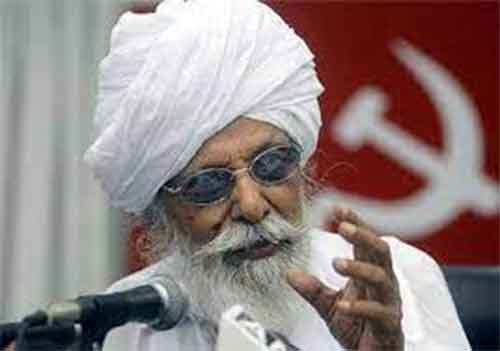
August 1, 2021, was the 13th death anniversary of comrade Harkishan Singh Surjeet. Born into a Bassi Jat family in the Punjabi village of Bundala on March 23, 1916, Surjeet began his revolutionary career influenced by the socialist revolutionary Bhagat Singh. In 1930 – at the age of 15 – he joined Bhagat’s Naujawan Bharat Sabha. On the first anniversary of his execution, Surjeet hoisted the Indian tricolor on a court in Hoshiarpur, an action that led the police to open fire. He survived but remained imprisoned in a juvenile jail until 1934. Undeterred, Surjeet declared his name as “London Tod Singh” – one who breaks London.
In his first term in jail, Surjeet interacted with Punjabi communists, ultimately joining the Communist Party of India (CPI) in 1934 and becoming a member of the Congress Socialist Party in 1935. He was elected as the secretary of the Punjab State Kisan Sabha in 1938. While writing patriotic poetry, and working for Punjabi papers, he acquired the nom de plume Surjeet – conqueror of the gods. Externed from Punjab for leading militant peasant struggles, he went to Saharanpur in Uttar Pradesh where he started Chingari (Spark), a monthly newspaper.
With the outbreak of WWII, Surjeet went underground but was arrested in 1940. He was incarcerated in the Lahore Red Fort and kept in solitary confinement for three months, in atrocious conditions. Surjeet was shifted to the Deoli detention camp where he remained until 1944. He almost lost his eyesight after he was forced to stay in an underground dungeon without any passage for sunlight for several months. Nevertheless, he tried to utilize this period as an opportunity to further study Marxism.
When India became independent in 1947, Surjeet was the CPI secretary in Punjab and was elected to the Punjab legislative assembly (1954-59). At the third congress of the CPI, he was inducted to the party’s Central Committee and Polit Bureau. He intensively participated in the campaigns of the Agricultural Workers Union and organized peasants in Punjab, becoming the President and General Secretary of the All India Kisan Sabha.
In 1964, when the CPI split, owing to Sino-Soviet differences, Surjeet constituted the core of the leadership of who formed the CPI (M). He was elected to the Central Committee and Polit Bureau of the CPI (M) at the Seventh Congress in 1964, continuing in these positions until the 19th congress held in March-April 2008 in Coimbatore. Three years later, he was elected to the Punjab legislative assembly for the party, serving until 1972. From 1978 to 1982, he was a member of the Indian parliament’s upper house.
In 1992, he became the general secretary of the Central Committee of the CPI (M) and retired from the post in 2005, at the age of 89, when the party held its 18th congress in New Delhi. Under Surjeet’s leadership, a concerted effort was made to combine anti-imperialist internationalism, anti-fascism and socialism. In his own words:
“In a situation where US imperialism is trying to further strengthen its hegemony and the attack on the democracy, peace and progressives has intensified internationally and at the national level the threat from the communal forces has increased, the Party will have to work with increased vigor and zest to take on the challenges and responsibilities thrown up by the situation.”
During the economic crisis in Cuba in early 1990s, Surjeet coordinated the biggest solidarity aid ever to the communist country. He called on farmers in Punjab to donate grains and other essential articles to Cuba, finally sending over 10,000 tonnes of wheat and other articles that cost crores of rupees to transport through ship.
On the domestic front, Surjeet played a crucial role in resisting divisive and communal forces. In the 1980s, CPI (M) vigorously resisted Khalistani terrorism, losing more than 200 of its cadre in the process. Surjeet himself was considered to be number one in the hit list of the Khalistan terrorists, but he journeyed across Punjab to speak against secessionist ideas, depending mainly on the protection provided by the CPI (M) cadre.
Surjeet played a crucial in 1989, 1996 and 2004 in creating political formations which excluded fascistic sectors. This – along with a principled anti-capitalism – allowed the CPI (M) to become the largest contingent of the Left movement in India. In 1990, Surjeet encapsulated the theoretico-practical essence of his political line:
“Our Party’s policies, tactics and programme…have stood the test of time. That is why in spite of the severe reverses and setbacks in the international communist movement our Party was able to stand united. At no stage in the history of our Party did we either trail behind any bourgeois party or give up our independent position, nor were we blind towards the divisions within the parties of the ruling classes. This gives us the confidence to march forward in the struggle for the defense of national unity, in defense of the interests of the masses, and in uniting with the other secular and democratic forces to advance the cause of Left and democratic unity.”
Yanis Iqbal is an independent researcher and freelance writer based in Aligarh, India and can be contacted at [email protected].

















































